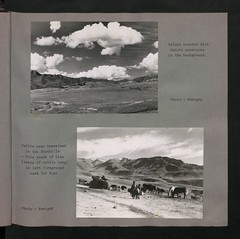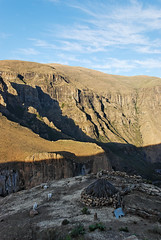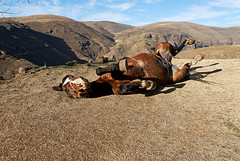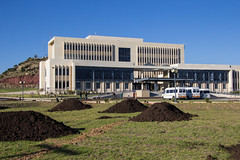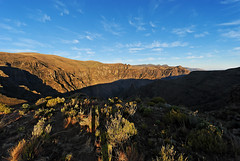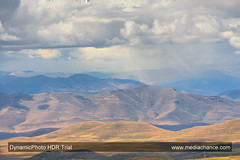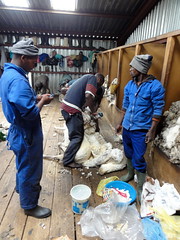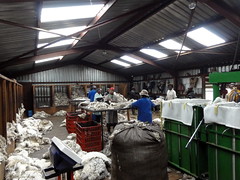 Lesotho
Lesotho
Lesotho (English: /ləˈst/ , Southern: [lɪˈsʊːtʰʊ]), officially the Kingdom of Lesotho, is a country landlocked as an enclave in South Africa. It is situated in the Maloti Mountains and contains the highest mountains in Southern Africa. It has an area of over and has a population of about million.
It was previously the British Crown colony of Basutoland, which was given independence by the United Kingdom on 4 October 1966. It is a fully sovereign state and is a member of the United Nations, the Commonwealth of Nations, the African Union, and the Southern African Development Community. The name Lesotho roughly translates to "land of the Sotho".
History
Basutoland
Basutoland emerged as a single polity under King Moshoeshoe I in 1822. Moshoeshoe, a son of Mokhachane, a minor chief of the Bakoteli lineage, formed his own clan and became a chief around 1804. Between 1820 and 1823, he and his followers settled at the Butha-Buthe Mountain, joining with former adversaries in resistance against the Lifaqane associated with the reign of Shaka Zulu from 1818 to 1828.
Further evolution of the state emerged from conflicts between British and Dutch colonists leaving the Cape Colony following its seizure from the French-allied Dutch by the British in 1795, and also from the Orange River Sovereignty and subsequent Orange Free State. Missionaries Thomas Arbousset, Eugène Casalis and Constant Gosselin from the Paris Evangelical Missionary Society, invited by Moshoeshoe I, were placed at Morija, developing Sesotho orthography and printed works in the Sesotho language between 1837 and 1855. Casalis, acting as translator and providing advice on foreign affairs, helped set up diplomatic channels and acquire guns for use against the encroaching Europeans and the Griqua people.
Trekboers from Cape Colony arrived on the western borders of Basutoland and claimed rights to its land, the first of which being Jan de Winnaar who settled in the Matlakeng area in 1838. Incoming Boers attempted to colonise the land between the two rivers and north of the Caledon, claiming that it had been abandoned by the Sotho people. Moshoeshoe subsequently signed a treaty with the British Governor of the Cape Colony, Sir George Thomas Napier, that annexed the Orange River Sovereignty where Boers had settled. These outraged Boers were suppressed in a skirmish in 1848. In 1851, a British force was defeated by the Basotho army at Kolonyama. After repelling another British attack in 1852, Moshoeshoe sent an appeal to the British commander that settled the dispute diplomatically, and then defeated the Batlokoa in 1853. In 1854, the British pulled out of the region, and in 1858, Moshoeshoe fought a series of wars with the Boers in what is known as the Free State–Basotho War. As a result, Moshoeshoe lost a portion of the western lowlands. The last war with the Boers ended in 1867 when Moshoeshoe appealed to Queen Victoria who agreed to make Basutoland a British protectorate in 1868.
In 1869, the British signed a treaty at Aliwal North with the Boers that defined the boundaries of Basutoland. This treaty reduced Moshoeshoe's kingdom to half its previous size by ceding the western territories. Then, the British transferred functions from Moshoeshoe's capital in Thaba Bosiu to a police camp on the northwest border, Maseru, until eventually the administration of Basutoland was transferred to the Cape Colony in 1871. Moshoeshoe died on 11 March 1870, marking the beginning of the colonial era of Basutoland. In the Cape Colony period between 1871 and 1884, Basutoland was treated similarly to other territories that had been forcibly annexed, much to the humiliation of the Basotho, leading to the Basuto Gun War in 1880–1881. In 1884, the territory became a Crown colony by the name of Basutoland, with Maseru as its capital. It remained under direct rule by a governor, while effective internal power was wielded by tribal chiefs. In 1905, a railway line was built to connect Maseru to the railway network of South Africa.
Independence
Basutoland gained its independence from the United Kingdom and became the Kingdom of Lesotho in 1966. The Basotho National Party (BNP) ruled from 1966 until January 1970. What later ensued was a de facto government led by Leabua Jonathan until 1986 when a military coup forced it out of office.
In January 1970, the ruling BNP lost the first post-independence general elections, with 23 seats to the Basotho Congress Party's (BCP) 36. Prime Minister Jonathan refused to cede power to BCP, instead declaring himself prime minister and imprisoning the BCP leadership. BCP began a rebellion and then received training in Libya for its Lesotho Liberation Army (LLA) under the pretense of being Azanian People's Liberation Army soldiers of the Pan Africanist Congress (PAC). Deprived of arms and supplies by the David Sibeko faction of PAC in 1978, the 178-strong LLA was rescued from their Tanzanian base by the financial assistance of a Maoist PAC officer and launched a guerrilla war. A force was defeated in northern Lesotho, and later guerrillas launched more sporadic attacks. The campaign was compromised when BCP's leader, Ntsu Mokhehle, went to Pretoria. In the 1980s, some Basotho who sympathised with the exiled BCP were threatened with death and attacked by the government of Leabua Jonathan. On 4 September 1981, the family of Benjamin Masilo was attacked. In the attack his 3-year-old grandson died. Four days later, Edgar Mahlomola Motuba, the editor of the newspaper Leselinyana la Lesotho, was abducted from his home, together with two friends, and murdered.
The Transitional Military Council that came to power granted executive powers to King Moshoeshoe II, who was until then a ceremonial monarch. In 1987 the king was forced into exile after coming up with a 6-page memorandum on how he wanted the Lesotho's constitution to be, which would have given him more executive powers than the military government had originally agreed to. His son was installed as King Letsie III in his place.
The chairman of the military junta, Major General Justin Metsing Lekhanya, was ousted in 1991 and replaced by Major General Elias Phisoana Ramaema who handed over power to a democratically elected government of BCP in 1993. Moshoeshoe II returned from exile in 1992 as an ordinary citizen. After the return to democratic government, King Letsie III tried unsuccessfully to persuade the BCP government to reinstate his father (Moshoeshoe II) as head of state. In August 1994, Letsie III staged a military-backed coup that deposed the BCP government, after the BCP government refused to reinstate his father, Moshoeshoe II, according to Lesotho's constitution. Member states of the Southern African Development Community (SADC) engaged in negotiations to reinstate the BCP government. One of the conditions Letsie III put forward for this was that his father should be re-installed as head of state. After protracted negotiations, the BCP government was reinstated and Letsie III abdicated in favour of his father in 1995, and ascended the throne again when Moshoeshoe II died at the age of 57 in a supposed road accident when his car plunged off a mountain road on 15 January 1996. According to a government statement, Moshoeshoe had set out at 1 am to visit his cattle at Matsieng and was returning to Maseru through the Maluti Mountains when his car left the road.
In 1997, the ruling BCP split over leadership disputes. Prime Minister Ntsu Mokhehle formed a new party, the Lesotho Congress for Democracy (LCD), and was followed by a majority of members of parliament, which enabled him to form a new government. Pakalitha Mosisili succeeded Mokhehle as party leader and LCD won the general elections in 1998. Opposition protests "intensified", culminating in a demonstration outside the royal palace in August 1998. While the Botswana Defence Force troops were welcomed, tensions with South African National Defence Force troops resulted in fighting. Incidences of rioting "intensified" when South African troops hoisted a South African flag over the Royal Palace. By the time the SADC forces withdrew in May 1999, much of the capital of Maseru "lay in ruins", and the southern provincial capital towns of Mafeteng and Mohale's Hoek had lost over a third of their commercial real estate.
An Interim Political Authority (IPA), charged with reviewing the electoral structure in the country, was created in December 1998. IPA devised a proportional electoral system to ensure that the opposition would be represented in the National Assembly. The new system retained the existing 80 elected Assembly seats, and added 40 seats to be filled on a proportional basis. Elections were held under this new system in May 2002, and LCD won, gaining 54% of the vote. There are irregularities and threats of violence from Major General Lekhanya. Nine opposition parties hold all 40 of the proportional seats, with BNP having the largest share (21). LCD has 79 of the 80 constituency-based seats. While its elected members participate in the National Assembly, BNP has launched legal challenges to the elections, including a recount.
On 30 August 2014, an alleged abortive military "coup" took place, forcing then Prime Minister Thomas Thabane to flee to South Africa for three days. On 19 May 2020, Thomas Thabane formally stepped down as prime minister of Lesotho following months of pressure after he was named as a suspect in the murder of his ex-wife. Moeketsi Majoro, the economist and former Minister of Development Planning, was elected as Thabane's successor.
On 13 May 2020, according to the health ministry, Lesotho became the last African nation to report a COVID-19 case.
On 28 October 2022, Sam Matekane was sworn in as Lesotho's new Prime Minister after forming a new coalition government. His Revolution for Prosperity party, formed earlier same year, won the 7 October elections.
Geography
Lesotho covers . It is the only independent state in the world that lies…
Looking for places related to Lesotho?
Those are other destinations to find places related to Lesotho:





